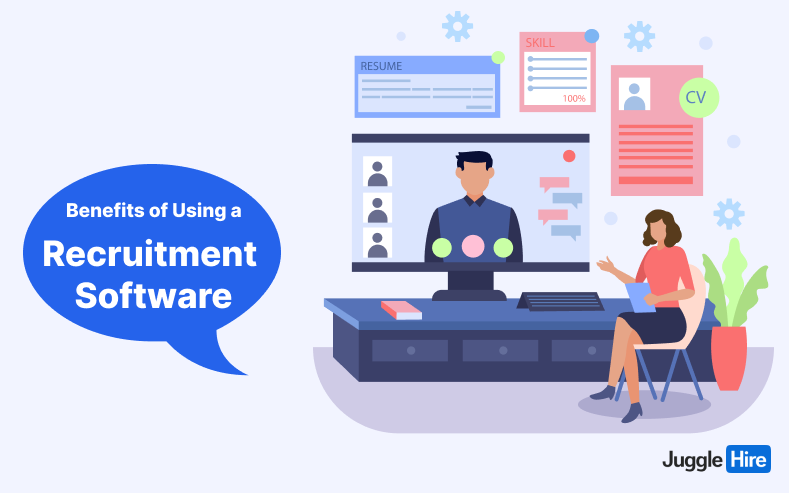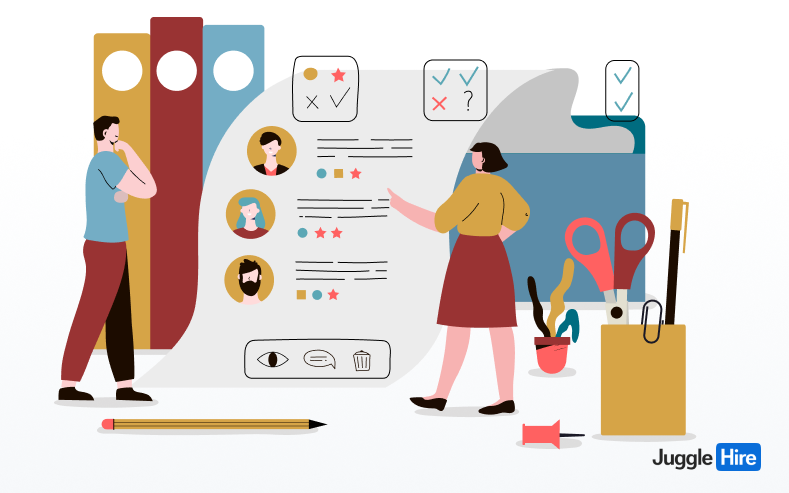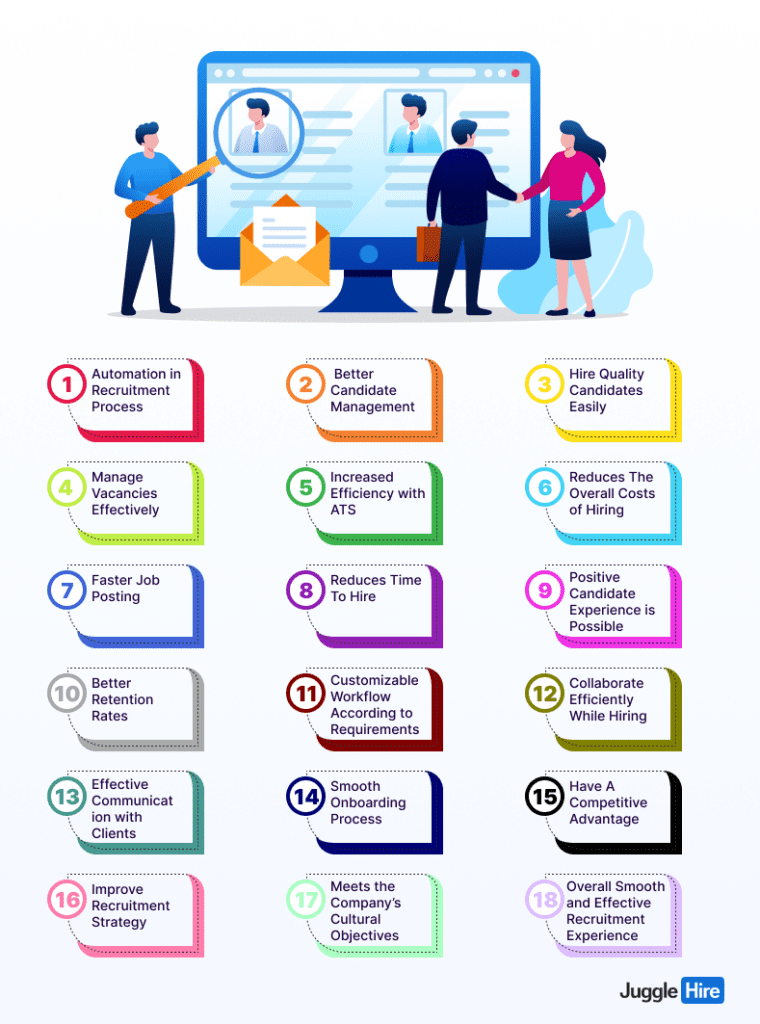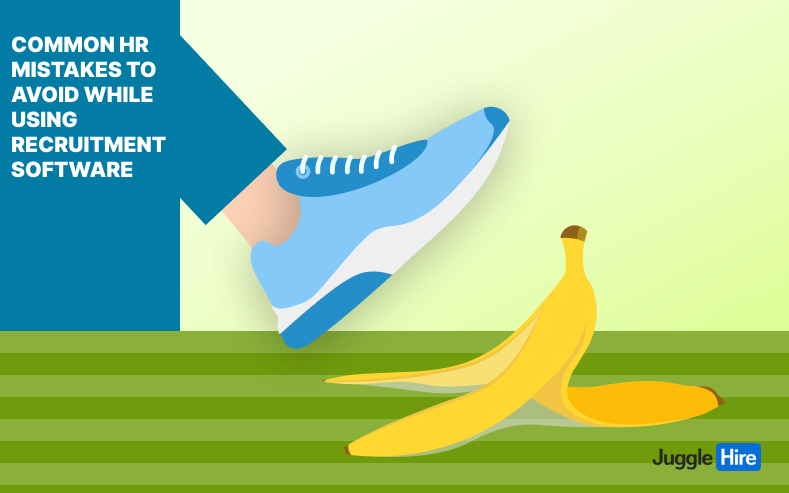15+ Benefits of Recruitment Software – An Ultimate Guide

Human Resources has always been an important sector for any industry. There are tons of responsibilities and challenges in this line of work. To handle them, smart recruitment software is becoming demanding.
Recruiters get 58% help in candidate sourcing, 56% help in candidate screening, and 55% help in nurturing candidates from AI and recruitment software.
webinarcare.com
So, it’s crucial to know the benefits of recruitment software, which is exactly what we are going to discuss today. After reading this post, you’ll get to know how recruitment software can save money, sanity, and time for an organization.
What Is A Recruitment Software?
According to Oracle, recruitment software is like a trusted sidekick for businesses that are on the lookout for their next team members. It takes care of the bulk of the work for hiring managers and HR folks. It makes their lives easier from the moment they start to use it.
At its core, recruitment software is a computerized wizard that guides hiring managers through the entire process of bringing in new talent. You might hear people toss around the term “Application Tracking System” when talking about recruitment software.
However, recruitment software means something bigger. It’s a multitool that deals with the nitty-gritty of tracking applicants.
Common Recruitment Software Features
Recruitment software is equipped with a range of features to streamline the hiring process and enhance efficiency. Here are some common features you can find in these solutions:
- Auto-Scheduling Tasks: Automate and schedule various recruitment tasks to reduce manual effort and enhance workflow efficiency.
- Scheduling Interviews: Efficiently schedule and manage interviews, ensuring smooth communication between candidates and interviewers.
- Report Generation: Generate comprehensive reports to gain insights into the recruitment process, aiding in data-driven decision-making.
- Candidate/Applicant Handling: Manage candidate applications seamlessly, from initial contact to the final hiring decision, optimizing the candidate experience.
- Onboarding: Facilitate a smooth onboarding process for newly hired candidates, ensuring a positive transition into the organization.
- Customized Hiring: Tailor the recruitment process to specific organizational needs with customizable features, supporting a personalized approach to hiring.
- Flexible Hiring: Adapt the software to different hiring scenarios and requirements, providing flexibility in managing diverse recruitment processes.
- Cloud Data Storage: Utilize secure cloud storage for storing and accessing recruitment-related data, promoting accessibility and data security.
- Candidate Experience: Prioritize the candidate experience by offering a user-friendly interface, clear communication channels, and transparent application processes.
- End-to-End Recruitment Process: Cover every aspect of the recruitment journey, from job posting to the final placement, ensuring a comprehensive and integrated approach.
- Agile Recruitment Process: Embrace agility in recruitment by incorporating features that support quick decision-making and responsiveness to changing hiring needs.
How Does a Recruitment Software Work?

Alright, let’s break down the capabilities of recruitment software. Any business would want the perfect crew for the best outcome. That is where recruitment software steps in. So, what is its gig?
With recruitment software, it’ll take less time to scan a vast sea of resumes and profiles. It sniffs out the best candidates faster than the manual process. Also, it’s hard to manage a list of potential recruits. But it becomes a breeze with recruiting software.
Often, HRs face critical scenarios when scheduling interviews. Recruitment platform software (such as JuggleHire) can untie the tangled ropes of interview schedules. It’ll give every candidate a fair shot to impress the employer.
Recruiting software tracks applications, updates, and progress. Therefore, hiring managers and HR professionals will always find it easier to identify the right candidate.
Recruitment software doesn’t stop once you have found your dream team members. It guides them through the onboarding process. Numbers, stats, and trends – oh my! Recruitment software juggles all this data. It gives solid insights into your hiring process.
Moreover, recruitment software may also foster smooth communication among your team members. So everyone remains on the same course during the hiring process. In a nutshell, recruit software is your Swiss army knife for finding the ideal candidate.
Common Problems a Recruiter Faces While Handling Recruitment Manually

Recruiters encounter various challenges when managing the recruitment process manually. These issues often hinder the efficiency of the hiring process and may lead to missed opportunities.
Let’s take a look at some common problems faced by recruiters:
I) Difficulty in Attracting the Right Candidates
Recruiters often struggle to attract qualified candidates from a vast pool of talent. Approximately 63% of hiring professionals face talent shortages. To address this, emphasizing clarity in job ads becomes crucial to attracting candidates with the right skills.
II) Extended Time-to-Hire
The prolonged time-to-hire poses a significant challenge, risking the loss of high-quality candidates. Lengthy recruitment processes result in candidate disinterest, potential productivity losses, and creativity stagnation. Automation through recruitment software can expedite the hiring process.
III) Inability to Build a Strong Employer Brand
Establishing a positive employer brand is essential, yet recruiters may face challenges in this aspect. A robust brand image is critical, as 75% of individuals would reject a job offer from a company with a bad reputation. Recruitment software can aid in showcasing a positive image through streamlined processes.
IV) Limited Talent Outreach
Challenges arise when qualified candidates are not found within the current applicant pool. Adopting multichannel recruitment strategies becomes essential to expand talent outreach. Limited outreach can impede the ability to find the right candidates for open positions.
V) Missing Out on Passive Candidates
Passive candidates constitute 70% of the workforce. They can pose a challenge in the hiring market. Targeting these individuals, especially for executive roles, becomes difficult without executive search software or passive recruitment strategies. Automation tools can help identify and engage with passive talent.
VI) Handling a Flood of Resumes
Dealing with an overwhelming number of resumes is a significant challenge for hiring managers. This becomes more challenging without the use of an Applicant Tracking System (ATS) to review and manage resumes efficiently.
VII) Scheduling Issues for Interviews
Complex interview scheduling due to differing schedules is a common problem. Implementing scheduling software that allows candidates to input their availability or reschedule interviews can streamline this process and enhance overall efficiency.
You Might be Interested In –
20 Common Recruitment Challenges and How to Solve Them
18 Benefits of Recruitment Software That Recruiters Must Know

The number is always increasing when it comes to the benefits of recruiting software. In particular, cloud based recruiting software revolutionizes the hiring process. Among many advantages, the following ones are worth pointing out.
Let’s start with the first benefit of recruitment software…
01. Automation in Recruitment Process
What is automation in the recruitment process? It is the process that automatically handles the administrative and manual tasks related to talent acquisition. Ultimately, it streamlines the entire hiring process.
Online recruitment software automates various tasks. It does the typical tasks of recruiting, such as posting jobs, tracking applicants, scheduling interviews, maintaining communications, and so on. On top of that, it reduces manual errors of HRs. So, recruiters can focus more on crucial aspects like interviews and candidate evaluations.
With automation, they get better control of the recruitment process. Recruitment automation software makes the hiring process more efficient.
02. Better Candidate Management
Recruitment software solutions play a crucial role in achieving organizational outperformance by offering a well-defined recruitment game plan. These tools empower hiring managers with faster responses, increased control, and the ability to actively participate in the overall recruitment process.
Through personalized and real-time data integration, HR professionals can become more agile in responding to employee needs across various stages, including interviews, onboarding, orientation programs, training, payroll, and career development.
03. Hire Quality Candidates Easily
Recruitment software stores candidate information in a centralized database. For instance, JuggleHire gives you the option to filter spam applicants. As a result, you spend less time screening the resumes.
Since it already narrows down the number of applicants by filtering spam, you can quickly identify whom to call for the interview. It also provides an effective way to shortlist candidates. As a result, you will have better chances of finding the most suitable candidate for a given role.
Advanced search options and effective filtering capabilities enhance the quality of hires. Also, it promotes quick and smooth communication throughout the application process. So, recruitment software can provide a competitive advantage to recruitment agencies.
04. Manage Vacancies Effectively
Utilizing recruiting software, such as JuggleHire, enables recruitment agencies to manage job vacancies efficiently. This includes the following –
- Recording and managing temporary
- Freelance or permanent positions
- Tracking candidate applications at each stage
- Monitoring interviews
- Employing AI-based job matching
- Recording candidate placements
- Conducting pre-employment assessment tests
This end-to-end recruitment management system ensures streamlined and organized management of all aspects of the hiring process.
05. Increased Efficiency with ATS
As said earlier, an Application Tracking System (ATS) can be a part of the recruitment software. HR managers can benefit more from recruitment tools that are equipped with an ATS. This is an excellent feature for storing candidate information.
Using an ATS, a small company can save around $10,000
This type of system ensures no candidate details are missing during the recruitment process. It updates each candidate’s status timely, integrates with calendars for event tracking, and detects duplicate profiles.
An ATS is a centralized platform to evaluate candidates and give feedback based on their activities. It fosters better collaboration between HR managers and recruiters. With unbiased hiring practices, an ATS ensures a standard evaluation process.
06. Reduces The Overall Costs of Hiring
The whole recruitment process can be time-consuming as well as costly. Although big companies can deal with recruitment expenses, it can be a burden for small ones. A recruitment software can be handy for them.
Modern recruitment software is associated with legacy HR management tools. As a result, it eliminates the complexity of the manual hiring process. This reduction in inefficiencies leads to lower operating costs. So small companies and startups can feel relieved since they don’t have to spend for hiring again and again.
Plus, HRs can avoid outdated practices and traditional recruiting fees. The flexibility and cost-effective integration make recruiting software a valuable investment for many companies.
07. Faster Job Posting
To find the right candidate quickly, recruiters need to act fast. So it becomes crucial to post jobs efficiently and quickly. Manual job posting takes time, and recruitment software like JuggleHire can speed up the process.
Almost 86.1% of individuals who use recruiting software experience faster hiring speed
Recruitment software streamlines paperwork and application procedures. This is how it accelerates the hiring process. Using recruitment software is like having all the important papers in hand. Plus, they don’t need to prepare separate documents for individual job postings; the software has everything under control.
This minimizes the time spent on repetitive and time-consuming tasks. So, it facilitates quicker job postings, which leads to a more efficient recruitment workflow.
08. Reduces Time To Hire
Recruiters spend a significant amount of time in the hiring process. On average, it takes 42 days to fill a vacancy. To find the right candidate for a higher position, the interval time can increase. They may struggle to handle other tasks as a result of this.
Cloud based recruitment software like (JuggleHire) provides global accessibility. So recruiters can stay updated from any location. It eliminates the time to set up a physical interview. Also, it confirms every person required for the interview is on board. Therefore, it cuts off the total time to hire.
They can use internet-connected devices to engage with applicants who are actively searching for jobs. This mobile-friendly approach enhances productivity.
09. Positive Candidate Experience is Possible
In today’s competitive job market, providing a positive candidate experience is crucial. Recruitment software facilitates open communication channels and detailed updates on application progress. They contribute to a streamlined and positive experience for candidates.
With the right software, companies can stand out by offering a more user-friendly and transparent application process. This, in turn, helps retain high-quality applicants, preventing them from losing interest and turning to competitors.

10. Better Retention Rates
High employee turnover is a costly problem for companies. Recruitment software addresses this challenge by carefully matching the right candidate with the right role, boosting employee satisfaction, and ultimately leading to better retention rates.
Amidst the challenges of the job market, recruitment software users report impressive statistics, such as 93% of employees hired through the software remaining in their roles after twelve months. This surpasses the national average considerably.
11. Customizable Workflow According to Requirements
Every organization and recruitment agency has a unique approach to the hiring process, and recruiters have varying requirements. Recruitment software solutions come to the rescue by offering customizable and scalable tools that can be tailored to specific workflows.
This adaptability ensures that recruiters and hiring professionals can conduct the hiring process according to their needs, ultimately leading to better results and improved efficiency in the recruitment process.
12. Collaborate Efficiently While Hiring
Recruitment software solutions facilitate efficient collaboration during the hiring process, involving various stakeholders like candidates, recruiters, line managers, and senior team members.
The recruiting software (like JuggleHire) provides a centralized dashboard, simplifying interview scheduling, feedback sessions, and communication. This eliminates paperwork and confusion, offering a clear overview of the recruitment timeline, feedback, and task completions for everyone involved.
13. Effective Communication with Clients
Recruiting software includes features like client self-service portals, enabling recruitment agencies to provide real-time updates to clients. This reduces dependency on recruiters, records client interactions, ensures clarity in work allocation, and maintains records of client proposals.
The system allows recruiters to stay updated on tasks, correct candidate information, and digitally manage candidates through each stage of the recruitment process, promoting equal treatment.
14. Smooth Onboarding Process
Hiring managers may have headaches thinking, “How to improve onboarding process?” Sometimes, an applicant may receive multiple job offers at once, and you might lose him for not offering an appointment letter on time.
This won’t happen with automated recruitment technology. Sending timely job offer emails will ensure you get the right candidate without arranging the interview again.
After the hiring part, recruitment software ensures an automated onboarding process. It can centralize candidate profiles and shortlisting. What’s more, it can transfer data collected during the hiring process to an HRIS (Human Resource Information System). This will allow the new recruit to become a team member in no time.
On top of that, the onboarding process becomes simpler for HR departments if the recruitment tool has a tracking feature. In that case, HR professionals will get easy access to essential information.
15. Have A Competitive Advantage
Utilizing recruitment software provides a competitive edge, as evidenced by 86.1% of recruiters using Applicant Tracking Systems (ATS) reporting increased hiring speed. The software enhances communication, tracks the entire application process, and ensures quick decision-making, positioning recruitment agencies ahead in the competitive hiring market.
16. Improve Recruitment Strategy
Small recruitment agencies benefit from recruitment software by managing business services efficiently and gaining insights into performance. The software helps agencies enhance their recruitment function by providing visual representations of projects, tasks, and overall agency performance.
Recruitment analytics and Key Performance Indicators (KPIs) help identify strengths and weaknesses in the hiring process, enabling informed decision-making.
17. Meets the Company’s Cultural Objectives
Recruitment software aids in attracting candidates whose values align with the company’s cultural objectives. The software allows filtering based on criteria such as family-focused or sustainability commitment.
“Workers with a strong connection to their employer are more engaged.”
According to the ADP Research Institute
Therefore, recruitment software assists in developing a company culture that resonates with the organization’s mission, attracting the right talent, and fostering employee engagement.
18. Overall Smooth and Effective Recruitment Experience
A good recruiter plays different roles in the hiring process. He thinks ahead and maintains good relationships with hiring managers. He identifies candidates’ unique skills. Moreover, he continuously improves himself, where a recruitment software can help.
94% of recruiters admit that using recruitment software has improved their hiring process
Recruitment software offers tools for efficient workforce management. For example, JuggleHire comes with a user-friendly interface to speed up the hiring process. In addition, it comes with a career portal, enables swift job posting, and sorts candidates effectively. Thus, it gives an enhanced recruiter experience by simplifying complex tasks.
Common HR Mistakes to Avoid While Using Recruitment Software

i) Writing One-Way, Vague Job Descriptions
Avoid using vague language in job descriptions, especially in the technical recruitment process. Clearly define roles, responsibilities, and skill requirements. Try to use engaging language that reflects company culture to attract the right talent.
ii) Focusing Only on Technical Skills
While technical expertise is crucial, also prioritize soft skills like communication and problem-solving during the recruitment process. Strive for a balance to ensure candidates contribute effectively in various aspects.
iii) Not Putting a Focus on Employer Branding
Don’t overlook the importance of building a strong employer brand. Highlight your company’s unique culture and commitment to employee growth. Additionally, create a positive workplace atmosphere to attract in-demand tech candidates.
iv) Conducting a Narrow Search
Avoid limiting your search to familiar sources. Expand your candidate pool by exploring remote candidates, utilizing professional networks like LinkedIn, and attending job fairs to identify diverse talent for the role.
v) Poor Candidate Care
Provide a positive candidate experience by prioritizing timely communication, clear explanations of the recruitment process, and transparency about job requirements. Ensure candidates feel respected through prompt and meaningful feedback.
vi) Asking Predictable Interview Questions
Steer clear of asking predictable interview questions, as this may reflect a lack of creativity and interest. Instead, challenge candidates with unique questions that showcase their problem-solving skills and expertise.
vii) Unintentional Bias
Be mindful of unintentional bias in the recruitment process. Avoid favoring candidates with similar backgrounds and experiences. Employ strategies like anonymizing resumes and conducting blind interviews to create a more diverse candidate pool.
viii) Having Too Many People Involved in Hiring
Keep the hiring team focused and small to avoid conflicting opinions and lack of clarity in decision-making. Clearly define roles and responsibilities to streamline the process and make effective hiring decisions for your IT team.
To Know More, Check Out –
Common HR Mistakes that You Should Avoid
Most Common FAQs on Benefits of Recruitment Software
What is recruitment marketing software?
It’s a type of tool that aids HR professionals and recruiters in promoting company culture. It focuses on targeting advertising campaigns on various digital platforms, including social media. The goal is to target quality candidates.
What is SaaS recruiting software?
Software as a Service software, or SaaS software in short is popular among recruiters worldwide. It offers databases and features through cloud storage. It ensures convenient solutions for effective recruitment processes.
Benefits of Recruitment Software – Ending Note
In this exploration, you have discovered the main benefits of recruitment software. Size does not limit its value – whether a recruitment firm is large or small, investing in recruitment software can be a game-changer. The investment is worth it for small and medium businesses with a modest budget.
If you think carefully, recruitment software actually reduces expenses in the long run. With the aforementioned benefits, small companies and startups can save budgets for other works by using recruitment software.
Ultimately, you can elevate your hiring process and find the deserving candidate sooner than expected.

Your point of view caught my eye and was very interesting. Thanks. I have a question for you.
I am glad to be of help. May I know what is your query?
We are using an ATS for our organization. We are getting help in candidate screening and tracking. However, not much luck in candidate nurturing.
I see…you can try a different ATS or recruitment solution like JuggleHire in that case.
Thanks for sharing. I read many of your blog posts, cool, your blog is very good.
Thanks Dang k’y. Subscribe to our newsletter for the newly published blogs.
Most recruitment tools are full of bugs. However, there are some with less bugs. Hopefully, your suggested ones will help
Sure, you will certainly find a suitable one from our list
Most of the time, HRs ask predictable questions to candidates, which is a huge mistake. Good point
Yes, it is true. After careful observation and talking to some HRs, we listed this issue.
Thank you for your sharing. I am worried that I lack creative ideas. It is your article that makes me full of hope. Thank you. But, I have a question, can you help me?
Sure, how can I help?
Your article helped me a lot, is there any more related content? Thanks!
Of course.. there are
Please subscribe to our newsletter